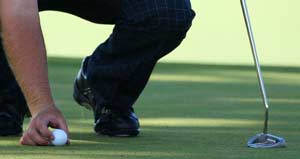The Hacker: Keith loses handicap battle but can still win the Boar war

Your support helps us to tell the story
From reproductive rights to climate change to Big Tech, The Independent is on the ground when the story is developing. Whether it's investigating the financials of Elon Musk's pro-Trump PAC or producing our latest documentary, 'The A Word', which shines a light on the American women fighting for reproductive rights, we know how important it is to parse out the facts from the messaging.
At such a critical moment in US history, we need reporters on the ground. Your donation allows us to keep sending journalists to speak to both sides of the story.
The Independent is trusted by Americans across the entire political spectrum. And unlike many other quality news outlets, we choose not to lock Americans out of our reporting and analysis with paywalls. We believe quality journalism should be available to everyone, paid for by those who can afford it.
Your support makes all the difference.It is sad to hear of a hacker in distress. I don't mean on the golf course, where distress is an inevitable part of a hacker's lot, but off it where we should at least get what we're entitled to.
Keith Boar is so disillusioned with the way high handicappers are treated at his club in Lancashire he has given up playing the game.
I highlighted Keith's problem last year after he wrote complaining that his club was ignoring the new directive that full handicap allowance had to be given in club competitions.
His club insisted on sticking to the old rule giving only three-quarters of the difference in match play which was officially denounced as being "enormously favourable" to the lower handicappers. Congu, which runs the handicapping system on behalf of all the golf unions and associations in GB and Ireland, concluded after years of research that the full difference would be much fairer.
Keith now tells me that after a long and futile fight to be allowed to play off his full handicap in competitions he has reverted to being just a social member. But he shouldn't give up just yet. I spoke to the Congu secretary, Kevin McIntyre, last week and he assured me that the new handicap rule was not a matter of choice for clubs. It is mandatory and it was up to national unions to enforce it.
I've heard since of one prominent club who refused to obey the new rule and were told by their union that they faced losing their affiliation, which makes it very difficult for them to function as a club. The full allowance quickly followed.
I suggest Keith takes his complaint further and I'd be interested to hear of any other hackers who are being robbed of their stroke entitlements.
As Keith says: "All amateur golfers are allowed to play on courses that the greats have played. This is unique in sport as is the system that allows the high handicapper to give the scratch player a reasonable game. Why should committees load the dice in the low handicappers' favour by imposing handicap limits?" It is a question Congu found increasingly unanswerable the more they looked into it. They couldn't even find the reason why the three-quarter limit ever existed.
When the new rule was introduced a couple of years ago there was uproar among the better players. Some refused to play in match-play competition because they felt the odds had been stacked against them. That was a nonsense as subsequent results have proved.
The advantage still lies with the better player and they still get looked kindly upon by the competition organisers.
For some reason Congu retained the three-quarter rule for better-ball matches. We had a better-ball medal last week and my partner Andy and I, both off 27, had our handicaps reduced to 20 each.
Had a pair of two handicappers been playing neither would have lost a shot so Andy and I, pathetic creatures that we are, would be giving them seven shots each before we even started. Hardly fair, is it?
I had a drink with a European Tour pro on Thursday and said that stars like him had no idea what it is like to be a high handicapper. "I certainly do," he said. "I used to be off 40. Mind you, I was only 10 at the time."
We can take the mockery but don't take our shots away.
Tip of the week
No 28: three-wood for safety?
How many times do you stand on a tee and reach for the three-wood because you feel it's safer than the driver? That may have been the case 10 years ago but with modern drivers you may need to think again. The new drivers have loft options up to 16 degrees (more than a three-wood), so they reduce the amount of sidespin. A three-wood today is designed with a shallow, elongated face to make it easy to get the ball airborne from the fairways – though not as ideal from the tee. With the right driver fitting, it should be every bit as forgiving as a three-wood from the tee and you'll get a few more yards!
Simon Iliffe, Head Professional, Purley Downs GC Surrey. www.theshortgame.co.uk
Join our commenting forum
Join thought-provoking conversations, follow other Independent readers and see their replies
Comments